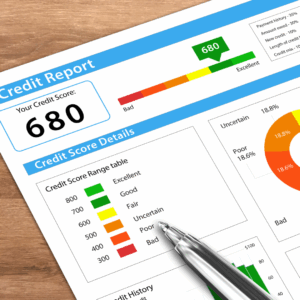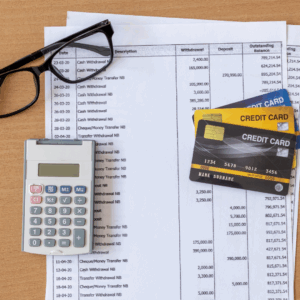
By Tyler Plack
Tyler Plack is the President of South River Mortgage. Tyler holds an active FHA Direct Endorsement (DE) underwriting certification and is the author of The Retirement Solution: Maximizing Your BenefitTyler is a seasoned entrepreneur and real estate investor renowned for his expertise in reverse mortgages and his commitment to addressing seniors' equity challenges. Tyler brings a unique perspective to his ventures, having built several successful companies throughout his career. His insights are frequently sought by industry publications, where he is recognized for his vast knowledge in the realm of reverse mortgages.
An avid investor in income-producing properties, Tyler is dedicated to helping seniors navigate their financial needs with compassion and expertise. When Tyler is not helping solve America's retirement crisis, he is a skilled pilot flying airplanes for fun.

When you’re applying for many types of credit — such as auto loans, personal loans, and credit cards — your FICO score is of prime importance.
It’s not the only thing lenders look at, but most of the time, your credit score can make or break your application. More specifically, lower FICO scores tend to lead to undesirable interest rates. If your score is very low, you may be denied altogether.
However, reverse mortgages are known for having flexible credit terms, and many people qualify even with poor FICO scores. Here’s a closer look at how your FICO score can impact your application for a reverse mortgage.
Are There Credit Score Requirements for Reverse Mortgages?
Many people considering a reverse mortgage want to know how high their FICO score needs to be. Unlike traditional mortgages, reverse mortgages don’t have a general credit score requirement. Instead, they have credit history requirements:
- All housing and debt payments have been on time in the last 12 months
- No more than two housing/debt payments have been late over the last 24 months
- No credit card payments have been more than 90 days late in the last 12 months
- No more than three credit card payments have been over 60 days late in the last 12 months
Even these requirements are flexible. The Federal Housing Administration (FHA) instructs lenders to think about how a reverse mortgage could help alleviate financial difficulties when evaluating credit history.
If your credit history has been damaged due to extenuating circumstances (but your application is otherwise strong), many lenders will approve you anyway.
How Poor Credit History May Influence Loan Terms
In many cases, you can still secure a reverse mortgage even when you have a few recent late payments on your credit report. However, if your lender has concerns, they may make a few adjustments to your loan terms.
One of the most common is something known as a life expectancy set-aside, or LESA.
This is a fund set up to pay your homeowners’ insurance, property taxes, and other costs of homeownership directly from your loan proceeds.
When you get a reverse mortgage, you don’t have to make monthly payments, but you are required to pay for property taxes, insurance, and general upkeep. A LESA serves as a safeguard to ensure these expenses are paid.
It’s also important to consider that poor credit history may limit your other financial options.
For example, many homeowners consider home equity loans and home equity lines of credit (HELOCs) when looking at ways to tap into their home’s equity during retirement.
Because both are repaid during your lifetime, home equity loans and HELOCs often require reasonably good credit scores and a reliable credit history.
Example Scenario — Poor Credit with LESA
Suppose you’re 70 years old with a $400,000 home, but you’ve had two late mortgage payments in the last year.
Instead of denying your application, your lender may approve your reverse mortgage with a $25,000 LESA to cover property taxes and insurance for the rest of your expected lifetime.
This ensures those bills are paid on time, while you still access the rest of your available funds as a lump sum or line of credit.
What About Requirements for Traditional Mortgages?
Your FICO score is much more important when you’re applying for a traditional mortgage. Different lenders have different requirements, but 620 is generally regarded as the minimum acceptable score to secure a mortgage.
However, if you want to secure a lower interest rate and favorable loan terms, a FICO score in the “very good” range (740+) is ideal.
Why Don’t Reverse Mortgages Have Stringent Credit Requirements?
A reverse mortgage is secured by your home. So is a traditional mortgage. So you might wonder — why does your FICO score matter so much for a traditional mortgage and so little for a reverse mortgage?
The answer comes down to how the loan is repaid. With a traditional mortgage, the lender must assess your ability to make monthly payments.
A poor FICO score might indicate that you’ll have trouble making payments on time or in full, so a lender may not want to take on the risk of lending to you.
However, when you have a reverse mortgage, the loan is not paid out of your income. In virtually every case, the loan is repaid from the proceeds of the sale of your home after your death.

Are You Eligible for a Reverse Mortgage?
(Find out in 60 seconds)
| Factor | Reverse Mortgage (HECM) | Traditional Mortgage |
|---|---|---|
| Minimum FICO | No official minimum | Usually 620 minimum |
| Key Focus | Recent housing & debt payment history | Full credit score & credit history |
| Late Payments | Allowed with explanation / LESA | May lead to denial |
| Income Verification | Not required for loan repayment | Required to qualify |
| Interest Rate Impact | Less tied to credit score | Heavily tied to credit score |
How to Strengthen Your Application
Even though credit requirements are more flexible for reverse mortgages, here are steps that can help smooth the approval process and improve your terms:
- Bring accounts current. Catch up on any late property taxes, mortgage, or credit payments before applying.
- Explain extenuating circumstances. Medical issues, natural disasters, or job loss can be considered. Lenders often accept written letters of explanation.
- Prepare documentation. Have records of on-time tax payments, insurance, and any recent financial improvements.
- Consider voluntary LESA. Even if not required, offering to set one up can reassure lenders and speed up approval.
- Talk to a reverse mortgage specialist early. They can identify issues before they become roadblocks.
Considering a Reverse Mortgage?
Reverse mortgages tend to be easier to qualify for than traditional mortgages and other kinds of credit. That might be a relief, but before you start your application, take the time to consider whether this option is in alignment with your retirement needs and goals.
That’s where we can help. The South River Mortgage team is here to answer your questions, discuss pros and cons, and otherwise help you determine whether a reverse mortgage is a good option for you. If you want to learn more about reverse mortgages, get an instant quote here today (totally free) to get started.
Just want to hear more about the process? Get in touch with us at 855-212-9114. Our licensed reverse mortgage experts will review your options and answer all your questions, no pressure or obligation.
FAQs
Can I qualify for a reverse mortgage with a credit score under 600?
Yes. There’s no set minimum FICO score for HECM loans. Lenders look at your payment history and overall financial situation instead.
Will a low credit score give me a worse interest rate?
Not necessarily. Reverse mortgage interest rates are more closely tied to market rates than to credit score, though poor credit may lead to a required LESA.
What happens if I have a recent foreclosure or bankruptcy?
You may still qualify after a seasoning period (often 2–3 years for bankruptcy), depending on the circumstances and your current situation.
Does improving my credit help?
Yes. While it’s not required, showing strong recent credit behavior can make the process smoother and may increase your available loan amount.
Will applying for a reverse mortgage affect my credit score?
A hard credit pull is usually part of the process, but the impact is typically minimal compared to other types of loans.



